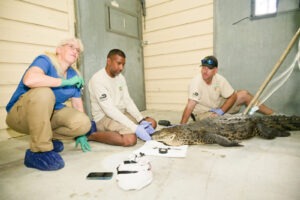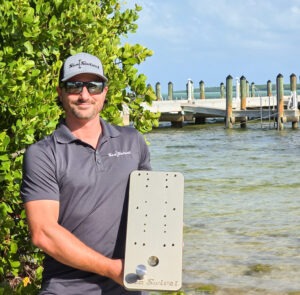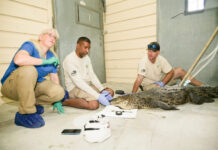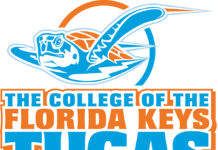Inside a Hillsborough County courthouse, state attorneys, public defenders, sheriffs and residents provided three hours of testimony to a committee tasked with recommending whether Florida’s 20 circuit courts should be consolidated.
A final public hearing on Oct. 13 heard many in-person and Zoom speakers pointing to overwhelming evidence of survey results the 14-person Judicial Circuit Assessment Committee (JCAC) received from 5,000 law professionals and 2,000 residents urging them not to support or recommend combining the circuit courts. Many believed the move wouldn’t provide any noticeable taxpayers savings, nor would it bring efficiencies to the court system.
Roughly 74% of the surveys filled out by the public came from Monroe County residents. And that wasn’t an anomaly, Monroe County Attorney Bob Shillinger said to the JCAC at the public hearing. Shillinger’s comments alluded to remarks by Naples-based attorney Laird Lile at a Sept. 15 meeting regarding the large number of surveys from the southernmost county.
“We did public outreach,” Shillinger explained. “We see it as a threat to our way of life. If you have any doubt of the level of opposition or sincerity, I invite you to hold a hearing in Monroe County.”
In July, the JCAC convened after Republican Speaker Paul Renner wrote to Chief Justice Carlos Muñiz stating that the current circuit boundaries haven’t changed since 1969. Renner specifically noted the size difference between the 2.7 million residents in Miami-Dade County’s 11th Circuit and the fewer than 100,000 people in Monroe County’s 16th Circuit Court.
Renner believed consolidation could lead to greater efficiencies and more uniformity in the judicial process. It’s something the JCAC is currently examining as members work to submit a final report by Dec. 1. Judge Jonathan Gerber, of the 4th District Court of Appeal, is the Judicial Consolidation Assessment Committee chair. The 14-person committee doesn’t have a representative from Monroe County’s 16th Circuit Court.
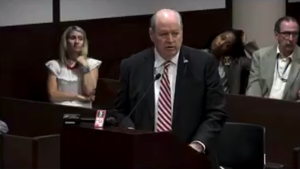
Shillinger was joined at the public hearing in Tampa by Monroe County State Attorney Dennis Ward and Monroe County Mayor Craig Cates, who was first to speak among the Keys contingent. Cates said he traveled to Tampa to express the county’s strong opposition to any merger with the larger neighboring 11th Circuit.
“While consolidating smaller courts into larger circuits might make sense in practice, it will spell disaster for the protection of the Florida Keys,” Cates said.
Ward told the JCAC the smallest circuit in the state runs a “pretty good show.” While the court system has a population size under 100,000, he said the southernmost courts serve more than 5 million visitors in addition to locals.
“When I first heard about this, I asked, ‘Why are we doing this? What’s the purpose here?’ There’s been different responses and after listening to them, I find it’s not necessary,” Ward said.
Shillinger added the last six election cycles in the Keys have seen a contested race for state attorney. He said the county would lose accountability and representation if the 11th and 16th circuit courts combined.
Retired Judge Gerardo Castiello spent more than a decade hearing compensation claims in Miami-Dade and Monroe counties. He discussed a project to land a third district of appeals judge in the Keys so residents didn’t have to travel hours to Miami-Dade.
“Folks in Monroe County were not properly served and I stopped that,” he said. “We’re not sending folks to Dade; it does not work for them.”
Keys resident Alberto Gonzalez also made the trek to the courthouse to share his thoughts. He said votes from registered Keys voters, including himself, would never count again if the 16th circuit court went away.
“This has nothing to do with consolidating courts,” he said. “It’s a political move to prevent certain state attorneys from being elected, and we’re just collateral damage.”
Appearing on Zoom, Islamorada Councilman Mark Gregg said the Keys do not have a wide turnpike or bustling downtowns. Rather, the Keys have the Everglades and the Florida Keys National Marine Sanctuary in its backyard.
“We are unique geographically from the 11th district,” he said. “And we’d be incompatible with their (Miami-Dade’s) way of administering justice.”
Some commenters believed court consolidations could bring a more uniform technology system. Not only that, it could also expand the jury pool for smaller counties whose residents are picked more frequently for jury duty. Kansas Gooden, a Miami-based attorney, said consolidations could address caseload disparities and availability of hearing times in some circuits.
Many sheriffs and state attorneys across the state, however, believed consolidations wouldn’t create positive change. Jack Campbell, Florida Prosecuting Attorneys Association president, said he’s never seen state attorneys and public defenders so united on an issue.
“It’s time for a JOA (judgment of acquittal). In any other case we’d lose this case for lack of evidence,” he said.
The JCAC will meet three times in November to develop, review and finalize findings and recommendations.















